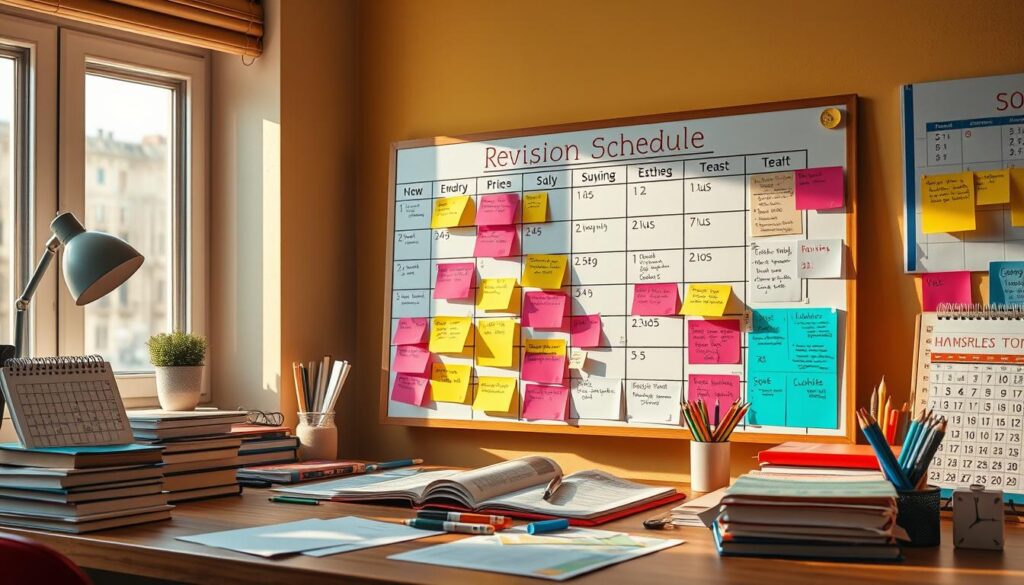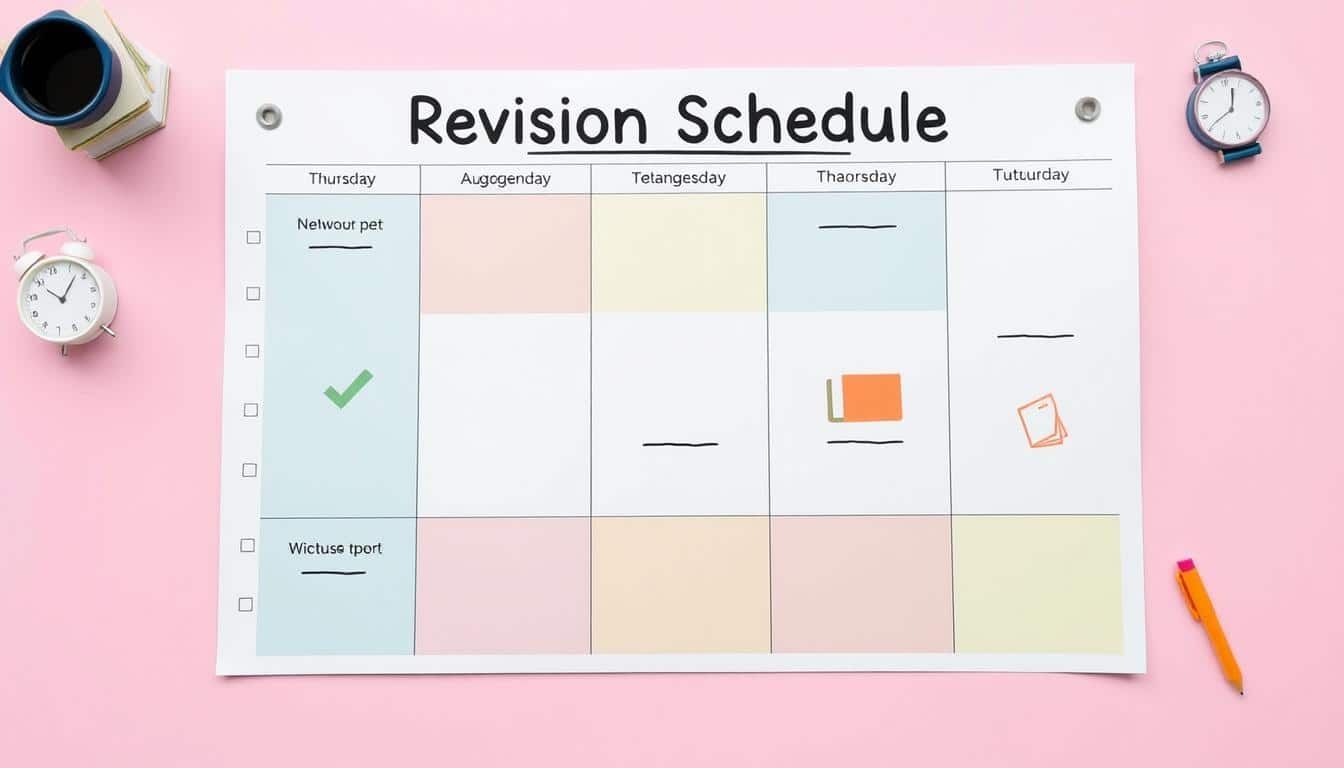Revision techniques are key for students getting ready for exams. They help remember and understand the syllabus better. This makes studying less overwhelming.
Having a good revision timetable is crucial for success, especially in online learning. It helps students plan their study time around other activities. Making a revision timetable before the study period is a smart move.
Key Takeaways
- Revision timetables help students allocate sufficient time for each subject and plan their study schedule effectively.
- Visual revision schedules provide a clear structure and predictability, which can minimize stress and improve time management.
- Creating a revision timetable encourages independent learning and motivates students to stay on track with their studies.
- Customizing the revision schedule to individual needs and learning styles can enhance the effectiveness of the revision process.
- Regularly reviewing and updating the revision timetable can help students stay adaptable and responsive to changing study demands.
Establishing Structure and Predictability
Creating a structured revision timetable is key for learning and exam prep. Waiting until the last minute can cause stress and lead to missing important topics. A detailed revision schedule helps you stay on track and study all subjects evenly.
Understanding the Importance of a Revision Timetable
A revision timetable acts as a guide, helping you manage your study time well. It involves setting aside specific days for each subject, based on its difficulty and your learning needs. Using a template, whether digital or printed, helps organize your study plan.
- Establishes a clear study plan and schedule
- Promotes a balanced distribution of revision time
- Reduces stress and anxiety by providing a sense of structure
- Enhances productivity and effective use of available time
- Encourages consistent and organized study habits
Embracing a revision timetable brings predictability and control to your studies. This leads to better learning and exam results.
Revision Schedules: A Key to Effective Time Management

Making a detailed revision timetable is key to mastering your studies. A good schedule helps you organize your time well. It leads to productive study sessions and better grades.
Maintaining Motivation and Encouraging Independent Learning
When making a revision plan, it must be realistic, detailed, and flexible. A realistic plan avoids stress by being achievable. Detailed plans focus on specific subjects, making revision productive. Flexible plans can change as needed, fitting your learning style.
A good plan includes study time and breaks. This balance keeps you motivated and prevents burnout. Digital tools and apps make managing your schedule easy, allowing for changes and access from anywhere.
Good time management is key to success. A well-made revision timetable helps you stay focused and motivated. By setting priorities and taking breaks, you can make the most of your study time.
“Individuals who practice good time management techniques often experience being more productive, having more energy, feeling less stressed, having more free time, getting more things done, relating more positively to others, and feeling better about themselves.”
Using time management strategies like the Time Management Matrix can boost your schedule’s effectiveness. Breaking tasks into smaller parts and focusing on important ones helps fight procrastination. This keeps you focused during your studies.
In summary, a well-designed revision timetable is a powerful tool for success. It promotes good time management, keeps you motivated, and encourages learning on your own. A good schedule helps you reach your full potential and do well in your studies.
Tailoring Revision Schedules to Individual Needs

Creating a good study plan starts with knowing which subjects need more work. Look at past mock results and teacher feedback to see where you need to improve. This helps make your study plan more focused and effective.
Customizing for Diverse Learning Styles and Preferences

Knowing how much time you have until exams is important. Instead of counting hours, think about the days left. This makes your study plan flexible yet structured.
It’s also important to include breaks and time for fun. This keeps your mind sharp and stops you from getting too tired. Make sure your study plan has regular breaks to stay focused.
Spaced repetition helps you remember things better. Studies show that even fruit flies can remember for a week or more with spaced intervals. The SuperMemo algorithm suggests reviewing material at 1 day, 7 days, 16 days, and 35 days for the best retention.
When making a study plan, think about how you learn best. Whether you’re a visual, auditory, reading and writing, or kinesthetic learner, a plan that fits you will work better. This way, you can use your study methods and revision techniques more effectively.
“Strategic review of material just before forgetting it can reset the forgetting curve and slow down memory decay, enhancing memory retention over time through spaced repetition.”
In the end, a study plan that fits your learning style and allows for breaks and celebrations will help you succeed. It’s all about finding a balance that works for you.
Also Read : Comprehensive Test Preparation Programs: A Step-By-Step Guide To Success
Conclusion
Making a good revision schedules is key for effective revision. It’s important to focus on the most important subjects. Also, having flexible study times and taking breaks helps a lot.
Using tools like color coding and revision apps can make planning easier. A balanced and flexible approach to study planning makes revision productive and stress-free. This leads to academic success and better well-being.
A revision timetable gives structure and predictability. It helps with time management and learning on your own. By making the timetable fit your needs, you can make your revision more effective. This leads to better personalized learning results.
In short, a detailed and flexible revision schedules unlocks your academic potential. By using this strategy, students can face exam challenges with confidence. This leads to academic success.
FAQs
Q: What are the main benefits of using a visual revision planner for my exam preparation?
A: A visual revision planner helps you organise your revision time effectively, allowing you to see at a glance the subjects you need to revise, the time slots you have available, and how to prioritise your study sessions. This can lead to a more structured and less stressful revision period.
Q: How can I allocate time slots for my revision sessions?
A: You can allocate time slots by assessing how many days you have until your exams and then dividing your study time into manageable chunks. Use a planner to create blocks of time dedicated to each subject, ensuring you cover all topic areas adequately.
Q: What are some effective revision tips to maximise my study sessions?
A: Some effective revision tips include using active recall techniques, creating flashcards, and working with past papers. Additionally, personalise your study planner to include achievable goals for each revision session, focusing on topics you’re weakest in.
Q: How can I use an exam timetable to stay on track during my revision period?
A: An exam timetable provides clear dates of your exams, allowing you to plan backwards. By knowing when each exam is scheduled, you can set goals for revision sessions and allocate time for each subject accordingly, ensuring you don’t leave anything to the last minute.
Q: What should I do if I find it hard to prioritise the subjects I need to revise?
A: If you’re struggling to prioritise subjects, consider evaluating your confidence in each area. Focus on subjects that you find more challenging or those that carry more weight in the exam. This ensures you’re spending time on topics that might come up in the exam.
Q: How can I incorporate regular refreshers into my revision schedule?
A: Incorporate regular refreshers by scheduling short revision sessions that revisit previously covered materials. You can use blocks of time for active recall practices or quizzes to reinforce what you’ve learned and to ensure the information stays fresh in your mind.
Q: What study methods are recommended for effective revision?
A: Recommended study methods include time-based revision, where you set specific time slots for studying, and plan-based revision, where you create a detailed study planner that outlines what to revise each day. You might also consider using tools like Google Calendar to keep track of your revision sessions.
Q: How can I manage time pressure as the exam day approaches?
A: To manage time pressure, start your revision early and stick to a well-structured planner. Break your revision into chunks of time with regular breaks, such as a 15 minute break after every hour of study. This will help you stay focused and reduce anxiety as the exam day approaches.
Q: What should I do if I run out of time to revise before the exams?
A: If you find you’re running out of time, reassess your study schedule and prioritise the most critical topics. Focus on areas that are most likely to come up in the exam and use targeted revision techniques like summarising notes or creating quick flashcards for the key points you need to remember.
Source Links
- https://www.explorelearning.co.uk/free-resources/essential-guide-to-revision-techniques/
- https://getadapt.co.uk/blog/revision-techniques-the-ultimate-revision-guide
- https://www.billabonghighschool.com/blogs/revision-techniques-for-students-10-best-ways-to-revise-concepts/
- https://www.oracle.com/construction-engineering/construction-scheduling/
- https://www.prospects.ac.uk/applying-for-university/university-life/7-time-management-tips-for-students
